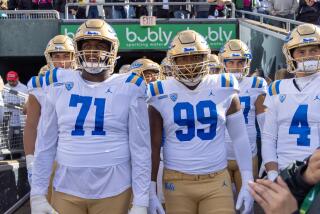Years of lobbying his parents to play football paid off for Harvard-Westlake’s Liam Douglass

- Share via
Starting at the age of 8, Liam Douglass began a nine-year lobbying campaign to persuade his parents to let him play football.
At 10, Douglass went on YouTube to learn how to do a PowerPoint presentation, then interrupted his parents watching a movie and showed them a 15-slide presentation. At 14, going into his freshman year at Studio City Harvard-Westlake, he wrote a four-page essay citing scientific information on injuries.
Each time, his father didn’t budge. No football.
Finally, last summer, while his mom and dad were eating a meal of chicken, rice and broccoli, Douglass tried again with a verbal presentation.
“I thought for weeks how I was going to approach them,” he said.
He made a plea for their hearts.
“I don’t want to look back 20, 30 years from now and say, ‘I wish I would have tried that,’ ” he said.
Finally, his father, Bill, the biggest holdout, agreed to let him play football.
Douglass remained calm.
“I shook my dad’s hand and looked him in the eyes and told him I’m not going to let him down,” he said.
One year later, after playing 11 games, Douglass has grown from 6 feet 4, 218 pounds to 6-5, 270 and has committed to play football in 2018 for USC.
Harvard-Westlake’s athletic director, Matt LaCour, calls Douglass a “man-child.”
Lots of waking up at 4:30 a.m. for weight training sessions has helped Douglass turn his body into a battering ram.
During a practice session, Douglass was always the first player hustling from drill to drill. He twice pancaked a freshman teammate during a blocking procedure. His father was worried about injury, but it’s Douglass’ size and strength that might have other parents feeling a little concerned.
He has dead lifted 490 pounds, runs 40 yards in 5.1 seconds and is so athletic he might make appearances at guard, center, tackle, running back, receiver and even quarterback this fall.
“His work ethic is off the charts,” coach Scot Ruggles said. “Everything he does is 100 mph.”
Bill Douglass, a literary agent, remembers telling his wife from the moment of Liam’s birth, “Promise me two things: No tackle football, no motorcycles.”
“We lived our life by that credo for 16 years,” he said.
He’s not alone among parents voicing concerns about letting their sons play football. There was a drop of more than 25,000 students playing high school football nationally last season, according to the participation survey from the National Federation of State High School Assns. A New York Times article in July highlighted that a neuropathologist had examined the brains of 111 former NFL players, and 110 had chronic traumatic encephalopathy, a degenerative disease linked to blows to the head.
“I feel football has helped me develop as a human being,” Douglass said. “I think there’s much better focus on tackling technique and more focus on safety.”
Douglass played baseball, but his pitching and hitting didn’t make him stand out by his junior year. And the door was closing on playing football in high school until his lobbying worked. He put on weight, gained strength and can’t wait to see what he can accomplish as a senior.
He has no regrets, even though he disagreed with his parents’ decision to prevent him from playing football so many years.
“I was definitely disappointed, but if anything it’s added to my desire to play,” he said. “I knew eventually something would happen and fall into place. It’s moved very fast. Coach Ruggles saw me compete for about a week and that’s when he saw something. After that, it was about getting as big, strong and as explosive as I could.”
Now his father has become a big football fan and even allowed Liam’s younger brother, Viswa, 14, to play as a freshman this season.
“What can I do?” he said. “When you say yes to one, it’s hard to say no to the other.”
Twitter: @latsondheimer
More to Read
Get our high school sports newsletter
Prep Rally is devoted to the SoCal high school sports experience, bringing you scores, stories and a behind-the-scenes look at what makes prep sports so popular.
You may occasionally receive promotional content from the Los Angeles Times.







